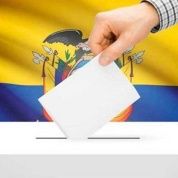With many people locked in their homes, erecting barricades and other obstacles, business closures and even suspension of classes in schools, Ecuador advanced towards Sunday’s election day, afflicted by a record of violence.

Turbulent deaths have quadrupled since 2019 and numbered 2,500 last year, as organized crime broke through prison walls, where riots recur, and extended its influence into communities.
Ecuador was one of the calmest countries in Latin America until about three years ago, when violence and cocaine-based criminality began taking over the prisons, streets, and now, potentially politics, according to some. pic.twitter.com/hkzsM6WTQC
— CGTN America (@cgtnamerica)
August 17, 2023
The wave of violence is expanding without state control and the president, Guillermo Lasso, signs level of exception after level of exception, with no plans to investigate crime and cut its causes.
Despite this extreme measure, Ecuador closed 2022 with the highest homicide rate in its history, 26 crimes per 100,000 inhabitants.
With almost 4,200 violent deaths so far this year, the South American country suffers a growing criminality, without security agencies and rampant corruption allowing to cut impunity.
At this tragic juncture, presidential candidate Fernando Villavicencio, whose electoral program had among its central points the calm and the fight against drug trafficking, was shot dead.
The deceased was not unfocused, because in recent years Ecuador has gone from being a drug transit territory to one in which drugs are stored, processed and distributed.
Criminal gangs, drug cartels and international mafias dispute spaces inside and outside prisons, without the State coming out of its worn-out rhetoric and reserving everything to the regime of exception while institutions are degraded, especially the justice system.
Almost on the verge of election day, the nation was once again shaken by the death of correismo leader Pedro Briones.
And Lasso, who had a mandate until 2025, but brought forward the elections to avoid impeachment due to corruption charges, affirms that Ecuador is ready to vote.
He organizes his withdrawal after reducing public expenditures, as his predecessor Lenin Moreno did, and unprotects the population which, disconcerted, does not manage to decide on favorable political platforms, as the street threatens.
On Thursday morning, the voting for the extraordinary presidential and legislative elections in Ecuador kicked off with the participation of incarcerated individuals awaiting a final verdict.
This process took place across 39 prisons, where 4,756 citizens were eligible to exercise their right to vote at 62 polling stations.
Finally, on late Thursday, Ecuadorian electoral authorities confirmed that, a few hours before the elections in the country next Sunday, the closing ceremonies of the campaigns of the presidential candidates took place.
This post was originally published on this site be sure to check out more of their content.






